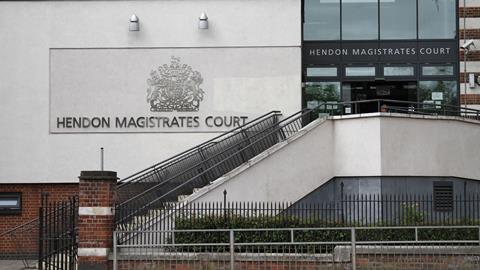I don’t think I’ve ever seen the back of a sitting judge before. But North London magistrates' courts don't have facilities for juries, so the 12 of us were required to enter by the judge's door and shuffle behind her chair in single file - carefully avoiding looking at her laptop screen - in order to take our seats.
It wasn't the only novelty created by the temporary conversion of Hendon Magistrates' Court into a Crown court as part of HM Courts & Tribunals Service's efforts to tackle the backlog. The main one was the need to accommodate six of us behind glass in the public gallery and the other six on exam-hall type seats in the well of the court. The magistrates' meeting room became our jury room; the only catering facility a sink and an electric kettle. There wasn't even a water cooler, though we were assured water would be available should we need it. On day four, most of the room's lights packed up - they still weren't working when the case concluded.
A more serious effect of the court's hasty conversion was the apparent lack of any public or press seating. I was assured by security that remote viewing facilities were available in a separate building - not that our case would have attracted much public or media attention. It involved distressing, but hardly out-of-the-ordinary allegations of assault, actual bodily harm and attempted rape arising from events on a scrap of parkland in a drab London suburb.
While I have sat through many trials, it was my first experience of seeing proceedings through a juror's eyes. (I'd long ago come to the conclusion that some weird software bug must be keeping me off the list.) Our randomly selected panel had seven women and five men, of an ethnic mix that looked roughly representative of that part of London. The main anomaly, which may merit further research, was that everyone seemed to have at least tertiary education: casual conversations revealed day jobs in academia, the City, civil service and one an architecture student. A quiet young man, who had kept his own counsel until raising a key point of law in a note to the judge, confided to me that he was a trainee at a law firm I know very well. He may go far.
As for the proceedings, much has changed since the dark ages of my reporting blue-collar crime. An obvious one was the complainant's evidence - and cross-examination - on video. It worked: I don't think we needed the judge's earnest instructions to treat it equally with in-person testimony. Another novelty - and here I'm showing my age - was the central role of DNA evidence. I know much thought has gone into the presentation of this stuff to lay audiences, but I think we can do better than the 'one in a billion' formula recited by the expert. My brainy fellow-jurors took it in their stride, however.
Judges, inevitably, are looking younger. And friendlier: our recorder, after reciting a blood-curdling scripted warning about internet research, came across as approachable and sympathetic. Both counsel, who delivered their closing speeches from lecterns seemingly inches from the jury's front row, impressed. They seemed well-prepared (though in truth one had very little to go on); the exhibits all turned up and the video evidence appeared on cue.
I obviously can't say anything about our deliberation - s.8 of the 1981 Contempt of Court Act is surely overdue for amendment, at least to allow properly conducted research - apart from that it was courteous and scrupulous. The shared experience brought 12 total strangers together as friends.
I expected to come away from the experience with a wish-list of demands for improvements. However given the limitations imposed by the set-up of the court building, the system worked pretty well. The case over-ran the estimate by two days and there were many frustrating periods of waiting, but the staff did their best to keep us informed. Some tea and coffee would have been nice - and the court's metal detector seemed to be turned up to an extraordinarily sensitive setting, but that's understandable.
The day after my discharge I received an email from HMCTS asking: 'Do you need emotional support?' It linked to a short film giving practical advice. Emotional support is also available from the Samaritans, Anxiety UK and the NHS, it concluded.
I think I'll manage.





































1 Reader's comment